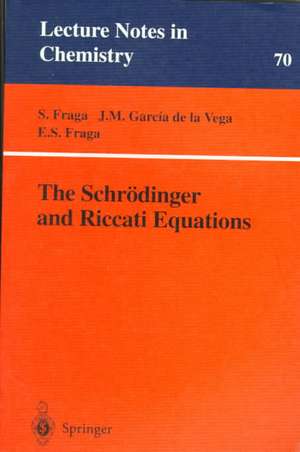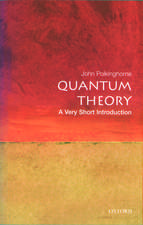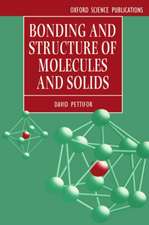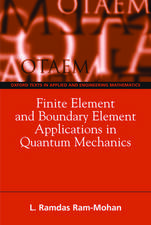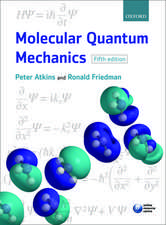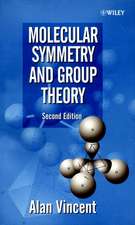The Schrödinger and Riccati Equations: Lecture Notes in Chemistry, cartea 70
Autor Serafin Fraga, Jose M. Garcia de la Vega, Eric S. Fragaen Limba Engleză Paperback – 18 noi 1998
The authors develop the Schrödinger-Riccati equation as an approach to determine solutions of the time-independent, linear Schrödinger equation.
Din seria Lecture Notes in Chemistry
-
 Preț: 96.74 lei
Preț: 96.74 lei - 18%
 Preț: 1123.35 lei
Preț: 1123.35 lei - 18%
 Preț: 776.72 lei
Preț: 776.72 lei - 18%
 Preț: 779.57 lei
Preț: 779.57 lei - 18%
 Preț: 1005.74 lei
Preț: 1005.74 lei - 18%
 Preț: 997.88 lei
Preț: 997.88 lei - 18%
 Preț: 1004.00 lei
Preț: 1004.00 lei - 18%
 Preț: 1136.30 lei
Preț: 1136.30 lei - 18%
 Preț: 1117.03 lei
Preț: 1117.03 lei - 18%
 Preț: 1006.55 lei
Preț: 1006.55 lei - 18%
 Preț: 903.62 lei
Preț: 903.62 lei -
 Preț: 377.73 lei
Preț: 377.73 lei -
 Preț: 395.63 lei
Preț: 395.63 lei - 18%
 Preț: 728.43 lei
Preț: 728.43 lei - 18%
 Preț: 782.57 lei
Preț: 782.57 lei - 18%
 Preț: 1112.78 lei
Preț: 1112.78 lei - 15%
 Preț: 688.13 lei
Preț: 688.13 lei - 15%
 Preț: 646.62 lei
Preț: 646.62 lei -
 Preț: 393.35 lei
Preț: 393.35 lei - 18%
 Preț: 1124.30 lei
Preț: 1124.30 lei -
 Preț: 384.86 lei
Preț: 384.86 lei -
 Preț: 383.71 lei
Preț: 383.71 lei -
 Preț: 378.71 lei
Preț: 378.71 lei -
 Preț: 384.09 lei
Preț: 384.09 lei -
 Preț: 387.42 lei
Preț: 387.42 lei -
 Preț: 388.90 lei
Preț: 388.90 lei -
 Preț: 393.35 lei
Preț: 393.35 lei -
 Preț: 384.09 lei
Preț: 384.09 lei -
 Preț: 377.73 lei
Preț: 377.73 lei -
 Preț: 382.95 lei
Preț: 382.95 lei -
 Preț: 384.70 lei
Preț: 384.70 lei - 15%
 Preț: 644.63 lei
Preț: 644.63 lei -
 Preț: 386.00 lei
Preț: 386.00 lei -
 Preț: 389.70 lei
Preț: 389.70 lei -
 Preț: 384.09 lei
Preț: 384.09 lei -
 Preț: 385.25 lei
Preț: 385.25 lei -
 Preț: 392.21 lei
Preț: 392.21 lei -
 Preț: 386.00 lei
Preț: 386.00 lei -
 Preț: 403.37 lei
Preț: 403.37 lei -
 Preț: 378.71 lei
Preț: 378.71 lei -
 Preț: 383.50 lei
Preț: 383.50 lei -
 Preț: 390.63 lei
Preț: 390.63 lei -
 Preț: 389.31 lei
Preț: 389.31 lei
Preț: 384.86 lei
Nou
Puncte Express: 577
Preț estimativ în valută:
73.64€ • 77.05$ • 61.18£
73.64€ • 77.05$ • 61.18£
Carte tipărită la comandă
Livrare economică 03-17 aprilie
Preluare comenzi: 021 569.72.76
Specificații
ISBN-13: 9783540651055
ISBN-10: 3540651055
Pagini: 240
Ilustrații: XIV, 218 p. 2 illus.
Dimensiuni: 155 x 235 x 13 mm
Greutate: 0.34 kg
Ediția:Softcover reprint of the original 1st ed. 1999
Editura: Springer Berlin, Heidelberg
Colecția Springer
Seria Lecture Notes in Chemistry
Locul publicării:Berlin, Heidelberg, Germany
ISBN-10: 3540651055
Pagini: 240
Ilustrații: XIV, 218 p. 2 illus.
Dimensiuni: 155 x 235 x 13 mm
Greutate: 0.34 kg
Ediția:Softcover reprint of the original 1st ed. 1999
Editura: Springer Berlin, Heidelberg
Colecția Springer
Seria Lecture Notes in Chemistry
Locul publicării:Berlin, Heidelberg, Germany
Public țintă
ResearchCuprins
1 Introduction.- The Linear Schrödinger Equation.- 2 Derivation of the Schrödinger Equation.- 3 The Schrödinger Equation in Position Space.- 4 The Schrödinger Equation In Momentum Space.- 5 The Local Schrödinger Equation.- 6 The Time-Dependent Schrödinger Equation.- The Non-Linear Schrödinger Equation.- 7 The Non-Linear Schrödinger Equation.- The Riccati Equation.- 8 The Riccati Equation and Its Solution.- 9 Quantum-Mechanical Applications of the Riccati Equation.- The Schrödinger-Riccati Equation.- 10 The Schrödinger-Riccati Equation.- 11 Numerical Experience with the Schrödinger-Riccati Equation.- 12 References and Bibliography.- Appendix. Matrix Notation.
Textul de pe ultima copertă
The linear Schrödinger equation is presented in the context of relativistic Quantum Mechanics. It is analysed in time-dependent and time-independent forms and its local and global properties are inspected. The authors develop the Schrödinger-Riccati equation as an approach to determine solutions of the time-independent, linear Schrödinger equation.
